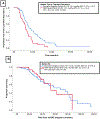The Prognostic Significance of Homologous Recombination Repair Pathway Alterations in Metastatic Hormone Sensitive Prostate Cancer
- PMID: 35871039
- PMCID: PMC10257153
- DOI: 10.1016/j.clgc.2022.06.016
The Prognostic Significance of Homologous Recombination Repair Pathway Alterations in Metastatic Hormone Sensitive Prostate Cancer
Abstract
Introduction: The homologous recombination repair (HRR) pathway is a frequently mutated pathway in advanced prostate cancer. The clinical course of patients with HRR gene alterations who have metastatic hormone sensitive prostate cancer (mHSPC) has not been fully characterized. Here, we examine the outcomes of men with mHSPC with HRR alterations.
Methods: We conducted a single-center retrospective analysis of men with mHSPC who underwent next generation sequencing. The primary objective was to assess the time from diagnosis of mHSPC to metastatic castrate resistance prostate cancer (mCRPC) in patients with pathogenic HRR alterations compared to individuals lacking these alterations. Key secondary objectives included time to mCRPC in prespecified cohorts, PSA response, and overall survival.
Results: 151 men with mHSPC were identified for the study. 24% (N = 37) had pathogenic HRR gene alterations detected with the most common alterations found in BRCA2 (n = 15), ATM (n = 10), and CDK12 (n = 7). Time to mCRPC was significantly decreased in patients with HRR gene alterations versus those without such alterations (12.7 vs. 16.1 months, HR 1.95, P = .02). In multivariate analysis, the effect of HRR gene alterations on time to CRPC remained significant when adjusting for age, mHSPC therapy, the volume of disease, the presence of visceral metastases, and PSA (adjusted HR 1.69, P = .02). Stratified by specific HRR gene alteration, patients with BRCA2 or CDK12 had significantly decreased time to mCRPC compared to other HRR alterations.
Conclusion: HRR gene alterations are associated with the worse outcomes in mHSPC with significantly shorter time to mCRPC. Given the established role of Poly (ADP-ribose) Polymerase (PARP) inhibitors in mCRPC, these data highlight an opportunity to examine PARP inhibitors earlier in the clinical course for prostate cancer patients. Ongoing prospective studies will further validate the role of PARP inhibitors in mHSPC patients.
Keywords: BRCA2; Biomarker; CDK12; CRPC; HRR; PARP inhibitors; PSA.
Copyright © 2022 Elsevier Inc. All rights reserved.
Conflict of interest statement
Conflicts of Interest
RRM received research funding from Bayer, Pfizer, Tempus; serves on Advisory Board/consultant for AstraZeneca, Aveo, Bayer, Bristol Myers Squib, Calithera, Caris, Dendreon, Exelixis, Janssen, Merck, Myovant, Novartis, Pfizer, Sanofi, Sorrento Therapeutics, Tempus, Telix.
The remaining authors have no conflicts of interest to disclose.
Figures


References
-
- Davis ID, Martin AJ, Stockler MR, et al. Enzalutamide with Standard First-Line Therapy in Metastatic Prostate Cancer. N Engl J Med. 2019;381(2):121–131. - PubMed
-
- Chi KN, Agarwal N, Bjartell A, et al. Apalutamide for Metastatic, Castration-Sensitive Prostate Cancer. N Engl J Med. 2019;381(1):13–24. - PubMed
-
- Robinson D, Van Allen EM, Wu YM, et al. Integrative Clinical Genomics of Advanced Prostate Cancer. Cell. 2015;162(2):454. - PubMed
MeSH terms
Substances
Grants and funding
LinkOut - more resources
Full Text Sources
Research Materials
Miscellaneous

